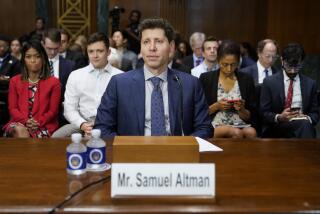AIG names firms that got bailout cash
- Share via
American International Group Inc. bowed to increasing pressure in Congress on Sunday and disclosed the names of dozens of banks and other institutions that benefited from the first chunk of $180 billion in bailout funds it received.
The concession came as public officials expressed outrage at the giant insurer’s decision to pay $165 million in bonuses to key employees.
“There are a lot of terrible things that have happened in the last 18 months, but what’s happened at AIG is the most outrageous,” Lawrence H. Summers, Obama’s top economic advisor, said on CBS’ “Face the Nation.”
AIG and the Federal Reserve have been pressured for months by some members of Congress to reveal the names of the banks and other institutions that were paid after the company -- teetering on the brink of failure because of plummeting investments -- received an $85-billion loan from the Fed in September.
AIG’s downward spiral was accelerated by losses related to its huge business of insuring high-risk mortgage securities against default, via complex agreements known as credit default swaps. As the housing meltdown worsened last year, AIG’s guarantees, which the company had sold to major banks and brokerages in the U.S. and abroad, came back to haunt it.
The federal rescue of the insurer has since doubled in size, and U.S. taxpayers now own 80% of the company.
The company said it shelled out nearly $100 billion in the final few months of the year to satisfy some of the contracts it had outstanding under credit default swaps and other insurance and investment agreements.
The beneficiaries included major foreign banks such as Germany’s Deutsche Bank and France’s Societe Generale, as well as U.S. titans Goldman Sachs Group and Merrill Lynch & Co.
U.S. municipalities, including some in California, also benefited as AIG settled up payments due under guaranteed investment agreements, under which states, cities and other municipalities temporarily park funds raised from bond sales. California entities received a total of about $1 billion.
The potential for an AIG collapse to bring down other financial giants worldwide, because of what the insurer owed other institutions, was the major justification the government cited for the massive bailout. But until now, taxpayers haven’t been told which institutions ultimately were on the receiving end of the money funneled to AIG.
“The aid received by AIG helped avoid severe financial disruptions by providing liquidity to important financial institutions and municipalities,” the company said in a statement.
The company’s critics, however, are likely to focus on whether AIG could have negotiated with its bank clients to pay less than demanded under the contracts, as a way to save U.S. funds.
But it was the outrage over the $165 million in bonuses paid to AIG brass that consumed the public and filled the airwaves Sunday.
Obama administration officials and top Republicans took to the political talk shows to deplore AIG’s payments of bonuses and retention pay to employees of its financial products division, which had engineered the money-losing deals with the other financial firms.
Summers said the administration’s hands were tied because AIG’s retention bonuses were part of contracts agreed to more than a year ago, before there was any bailout.
Senate Minority Leader Mitch McConnell (R-Ky.) said on ABC’s “This Week” that other companies might use AIG as a template for improper bonuses of their own.
“The message here, I’m afraid, to any business out there that’s thinking about taking government money is, ‘Let’s enter into a bunch of contracts real quick, and we’ll have the taxpayers pay bonuses to our employees,’ ” McConnell said. “This is an outrage.”
Readers were angry after reading a Times story Sunday on the bonuses and the administration’s grudging acknowledgment that most of them must be paid.
“Paying the creeps, I don’t care on what level they are on, is nuts!” Rola Cook of Molalla, Ore., wrote in an e-mail. “Let ‘em go to court. Let ‘em sue. Let ‘em go to hell!”
During CBS’ “60 Minutes” program in which Federal Reserve Chairman Ben S. Bernanke was interviewed, Michael Shields of Minneapolis tried to stir up an e-mail campaign to let Bernanke know that Americans “have incurred enough pain and suffering” and want the payments stopped.
Referring to the government owning 80% of AIG’s stock, he said in an e-mail to Bernanke: “As a shareholder of AIG, I am casting my vote to cease further bonus payments until such a time as AIG has paid back all existing shareholders (a.k.a. taxpayers).”
Bernanke, meanwhile, again expressed his ire over the AIG bailout, saying it had angered him the most over the last 18 months, as economic disaster followed upon economic disaster. He recalled “slamming the phone more than a few times on discussing AIG.”
AIG has received $40 billion in Treasury Department bailout funds so far, in addition to about $110 billion from the Federal Reserve. On March 2, the Treasury and the Fed announced they were restructuring the bailout and also giving AIG access to as much as $30 billion more in exchange for preferred stock, should the company need it.
AIG did reduce some of its bonus payments last week under pressure from Treasury Secretary Timothy F. Geithner but said it was legally obligated to pay $165 million to the financial products employees, or else they not only could seek punitive damages but might quit. That could cause even higher losses, the insurer said, because these are the only employees with the knowledge to “unwind” AIG’s complex financial deals.
Many weren’t buying those arguments.
“Fine, I respect contracts. But fire them. Get rid of them. That’ll soften the anger we feel toward the failed AIG management team,” said Stuart Fink of Los Angeles.
Ray Hernand of Woodland Hills said the government should let AIG fail.
“I am tired of throwing good money after bad money,” said Hernand, an information technology director in the entertainment industry. “If it’s that convoluted, then the government should take over AIG, unravel and cancel those agreements and contracts, and let AIG die a disgraceful death.”
Addressing such criticisms on television, Summers expressed sympathy but said the terms of the employee contracts must be legally observed.
“The easy thing would be to just say . . . ‘Off with their heads, violate the contracts,’ ” Summers said. “But you have to think about the consequences of breaking contracts for the overall system of law, for the overall financial system.”
Summers said Geithner used all his power, “both legal and moral, to reduce the level of these bonus payments.”
But one leading academic in the national policy debates said Geithner should have reined in AIG compensation when, in his former role as the head of the New York Federal Reserve Bank, he was working with Bush administration Treasury Secretary Henry M. Paulson to negotiate the first round of bailouts.
Geithner “should be embarrassed,” said Peter Morici, a University of Maryland business professor and former chief economist for the U.S. International Trade Commission.
“When the Bush White House agreed to bail out General Motors and Chrysler, it required those companies to renegotiate their labor contracts,” Morici said.
“Why did Secretaries Paulson and Geithner not require the same at AIG? The threat was the same with AIG and GM. If either shut down, the economy would plummet into chaos and depression, we were told,” Morici said.
Robert Gorges, a retired Ralphs grocery worker from Highland, near San Bernardino, agreed.
Auto workers, he said, “had a contract but they did the right thing, knowing their company was in bad financial trouble. They changed their contract,” he said. “Not the same can be said about AIG,” Gorges said in his e-mail to The Times. “Something is wrong here.”
--
tom.petruno@latimes.com
More to Read
Inside the business of entertainment
The Wide Shot brings you news, analysis and insights on everything from streaming wars to production — and what it all means for the future.
You may occasionally receive promotional content from the Los Angeles Times.











